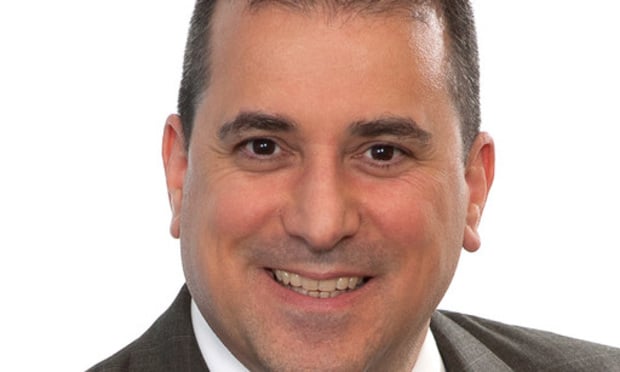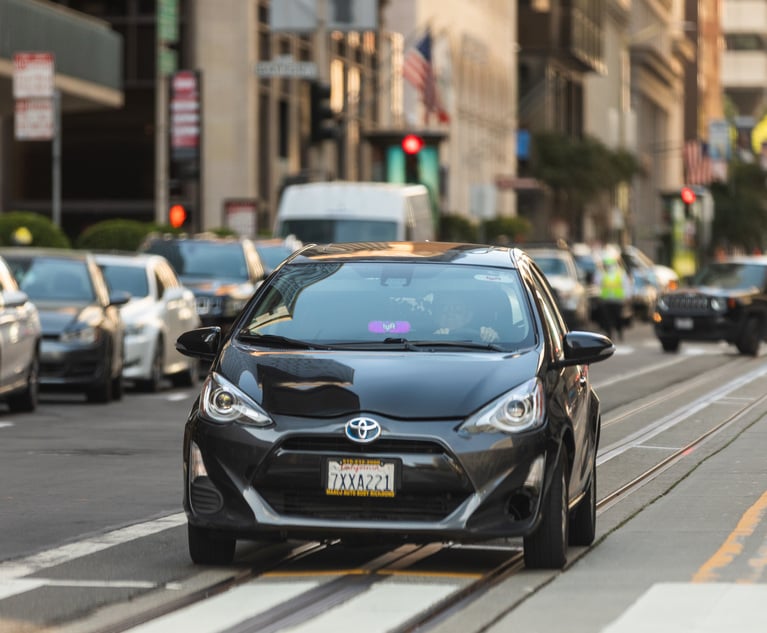Accrual of Statute of Limitations on Claims for Uninsured Motorists Benefits Clarified
Pennsylvania law requires auto insurers to offer insureds the option to purchase uninsured motorist (UM) coverage. UM coverage provides compensation for insureds injured in accidents caused by the negligence of uninsured drivers or in “hit and run” accidents where the at-fault driver is never identified or by the negligence of underinsured drivers.
January 25, 2018 at 04:36 PM
7 minute read

Pennsylvania law requires auto insurers to offer insureds the option to purchase uninsured motorist (UM) coverage. UM coverage provides compensation for insureds injured in accidents caused by the negligence of uninsured drivers or in “hit and run” accidents where the at-fault driver is never identified or by the negligence of underinsured drivers.
An insurance policy is a written contract. Actions brought under an insurance policy are thus subject to the four-year statute of limitations applicable to written contracts set forth at 42 Pa. C.S. Section 5525(a)(8).
The general rule is that the limitations period commences at the time the cause of action accrues. Generally, an action on a contract accrues at the time of the alleged breach. Accordingly, one would expect that the statute of limitations for a suit under a policy providing UM coverage would accrue at the time the insurer either denies the UM claim or refuses to pay benefits in the amount claimed by the insured. Until recently, however, Pennsylvania jurisprudence dictated that for purposes of UM claims the statute of limitations begins to run when an injured party in an auto accident first learns that the other driver is uninsured, as in Boyle v. State Farm Mutual Auto Insurance, 456 A.2d 156, 157 (Pa. Super. 1983); Hopkins v. Erie Insurance, 65 A.3d 452 (Pa. Super. 2013). The Pennsylvania Supreme Court recently reversed these precedents in Erie Insurance Exchange v. Bristol, No. 124 MAP 2016, 2017 Pa. LEXIS 3183, at *1 (Nov. 22, 2017).
In Bristol, the insured was injured in a hit-and-run accident on July 22, 2005, while in the course of his employment. His employer's auto insurance policy contained an uninsured/underinsured motorist coverage endorsement which afforded coverage of $500,000 per accident and included an arbitration clause. The arbitration clause provided for binding resolution of disputes over liability and the amount of damages under the endorsement, reserving other disputes, including the applicability of any statute of limitations, to the courts.
The insured asserted a UM claim under the employer's policy on June 19, 2007. By letter dated July 9, 2007, the insurer reserved its rights. Subsequently, both parties selected arbitrators and the insurer obtained a statement under oath from the claimant. In September 2012, the parties agreed to postpone proceedings due to the claimant's incarceration. In May 2013, the insurer filed a declaratory judgment action seeking a declaration that the claimant's UM claim was time barred.
Based on the Superior Court decisions in Boyle and Hopkins, the insurer argued that the statute of limitations began to run on the date of the accident, July 22, 2005, when the insured was unable to identify the vehicle involved in the hit-and-run, i.e., when he became aware he had a UM claim. The insurer averred that, by failing to file a “savings action with a court of competent jurisdiction” by the date the four-year limitation expired on July 22, 2009, the UM claim was time barred. The insured countered by arguing that the reservation of rights and agreement to arbitrate precluded application of the statute of limitations because, in such circumstances, there is no contractual requirement to file a court action. Alternatively, the insured argued that if the statute commenced, it was tolled by the agreement to arbitrate and selection of the first two arbitrators.
The trial court held that the statute commenced to run on the day of the accident, which occurred over a year prior to the selection of any arbitrators, and that, pursuant to the Superior Court's opinions in Boyle and Hopkins, commencement of court action is required to toll the running of the four-year time limitation. The Superior Court affirmed, holding that the statute begins to run on a UM claim when an insured sustains an injury as a result of a motor vehicle accident and knows the owner or operator of the other vehicle is uninsured. The Superior Court also rejected the insured's argument that his demand for arbitration under the policy tolled the statute of limitations. The Pennsylvania Supreme Court granted allowance of appeal to determine when the statute of limitations begins to run on a UM claim under in a policy containing an arbitration agreement.
The Supreme Court observed that the Superior Court's holding that the statute begins to run when the insured knows that the driver that caused the accident was uninsured had departed from standard contract principles. Accordingly, the court considered whether a basis exists to deviate from the general rule relative to when the statute of limitations begins to run in a UM case.
First, the court explained that prior cases in which it had held that the common law notions of accrual of a cause of action did not apply to the No Fault Act (the predecessor to the Motor Vehicle Financial Responsibility Law (MVFRL) were not relevant to the question before it. That departure from common law principles was grounded in the specific language of the No Fault Act. Construction of a provision of the MVFRL was not at issue and did not supply a rationale for deviating from the general rule that in contract cases it is an alleged breach of a duty under the contract that starts the running of the statute of limitations.
The parties advanced policy arguments in support of their respective positions as to why the traditional common law principles should or should not apply to UM claims. These arguments focused on the possibility of abuse of the claims process. The insurer argued that the common law rule permits an insured to manipulate the limitations period by simply delaying submission of the claim. The insured argued that the rule stating that the claim accrues when the insured learns that the other driver is uninsured encourages an insurer to delay processing of the claim to lull the insured into a false sense of security.
The Supreme Court declined to engage in a detailed analysis of the policy arguments. The court was not confronted with an interpretation of a contract provision affecting UM coverage or an interpretation of a specific provision of the MVFRL. Accordingly, the court concluded that it need not engage in a targeted public policy analysis in the context of such interpretations. As for the parties policy concerns, the court observed that any abuses could be addressed on equitable grounds or other ways based on particular facts, but that they did not justify departing from normal breach of contract principles attendant to triggering the statute limitations.
In sum, the court concluded that absent a compelling public policy ground or legislative intent, there was no reason to create a special rule for determining when the statute of limitations starts to run in UM cases. Accordingly, the proper circumstance to start the running of the limitation period is an alleged breach of the insurance contract. The court overruled the Superior Court decisions in Boyle and its progeny to the extent those cases are at variance with the holding
Where the insurance contract provides for arbitration, the breach occurs when the insurer denies coverage or refuses to arbitrate. Because it was undisputed that the insurer had not refused arbitration or denied coverage, it followed that the insured had no accrued cause of action.
Kenneth Portner, a partner at Weber Gallagher Simpson Stapleton Fires & Newby based in the firm's Philadelphia office, has experience advising, counseling and representing insurance companies. His insurance practice includes coverage and bad faith avoidance matters and E&O matters. He may be reached at [email protected].
This content has been archived. It is available through our partners, LexisNexis® and Bloomberg Law.
To view this content, please continue to their sites.
Not a Lexis Subscriber?
Subscribe Now
Not a Bloomberg Law Subscriber?
Subscribe Now
NOT FOR REPRINT
© 2025 ALM Global, LLC, All Rights Reserved. Request academic re-use from www.copyright.com. All other uses, submit a request to [email protected]. For more information visit Asset & Logo Licensing.
You Might Like
View All
Federal Judge Sides With Lyft Driver in Contractual Dispute Over $1M Uninsured Motorist Coverage
5 minute read
Federal Judge Sides With Insured in Dispute Over Nationwide's UIM 'Clarifications'
6 minute read
Judge Affirms $625K Jury Award to Car Salesman Accusing Phila. Dealership of Creating a Hostile Work Environment
6 minute readTrending Stories
- 1Uber Files RICO Suit Against Plaintiff-Side Firms Alleging Fraudulent Injury Claims
- 2The Law Firm Disrupted: Scrutinizing the Elephant More Than the Mouse
- 3Inherent Diminished Value Damages Unavailable to 3rd-Party Claimants, Court Says
- 4Pa. Defense Firm Sued by Client Over Ex-Eagles Player's $43.5M Med Mal Win
- 5Losses Mount at Morris Manning, but Departing Ex-Chair Stays Bullish About His Old Firm's Future
Who Got The Work
J. Brugh Lower of Gibbons has entered an appearance for industrial equipment supplier Devco Corporation in a pending trademark infringement lawsuit. The suit, accusing the defendant of selling knock-off Graco products, was filed Dec. 18 in New Jersey District Court by Rivkin Radler on behalf of Graco Inc. and Graco Minnesota. The case, assigned to U.S. District Judge Zahid N. Quraishi, is 3:24-cv-11294, Graco Inc. et al v. Devco Corporation.
Who Got The Work
Rebecca Maller-Stein and Kent A. Yalowitz of Arnold & Porter Kaye Scholer have entered their appearances for Hanaco Venture Capital and its executives, Lior Prosor and David Frankel, in a pending securities lawsuit. The action, filed on Dec. 24 in New York Southern District Court by Zell, Aron & Co. on behalf of Goldeneye Advisors, accuses the defendants of negligently and fraudulently managing the plaintiff's $1 million investment. The case, assigned to U.S. District Judge Vernon S. Broderick, is 1:24-cv-09918, Goldeneye Advisors, LLC v. Hanaco Venture Capital, Ltd. et al.
Who Got The Work
Attorneys from A&O Shearman has stepped in as defense counsel for Toronto-Dominion Bank and other defendants in a pending securities class action. The suit, filed Dec. 11 in New York Southern District Court by Bleichmar Fonti & Auld, accuses the defendants of concealing the bank's 'pervasive' deficiencies in regards to its compliance with the Bank Secrecy Act and the quality of its anti-money laundering controls. The case, assigned to U.S. District Judge Arun Subramanian, is 1:24-cv-09445, Gonzalez v. The Toronto-Dominion Bank et al.
Who Got The Work
Crown Castle International, a Pennsylvania company providing shared communications infrastructure, has turned to Luke D. Wolf of Gordon Rees Scully Mansukhani to fend off a pending breach-of-contract lawsuit. The court action, filed Nov. 25 in Michigan Eastern District Court by Hooper Hathaway PC on behalf of The Town Residences LLC, accuses Crown Castle of failing to transfer approximately $30,000 in utility payments from T-Mobile in breach of a roof-top lease and assignment agreement. The case, assigned to U.S. District Judge Susan K. Declercq, is 2:24-cv-13131, The Town Residences LLC v. T-Mobile US, Inc. et al.
Who Got The Work
Wilfred P. Coronato and Daniel M. Schwartz of McCarter & English have stepped in as defense counsel to Electrolux Home Products Inc. in a pending product liability lawsuit. The court action, filed Nov. 26 in New York Eastern District Court by Poulos Lopiccolo PC and Nagel Rice LLP on behalf of David Stern, alleges that the defendant's refrigerators’ drawers and shelving repeatedly break and fall apart within months after purchase. The case, assigned to U.S. District Judge Joan M. Azrack, is 2:24-cv-08204, Stern v. Electrolux Home Products, Inc.
Featured Firms
Law Offices of Gary Martin Hays & Associates, P.C.
(470) 294-1674
Law Offices of Mark E. Salomone
(857) 444-6468
Smith & Hassler
(713) 739-1250






